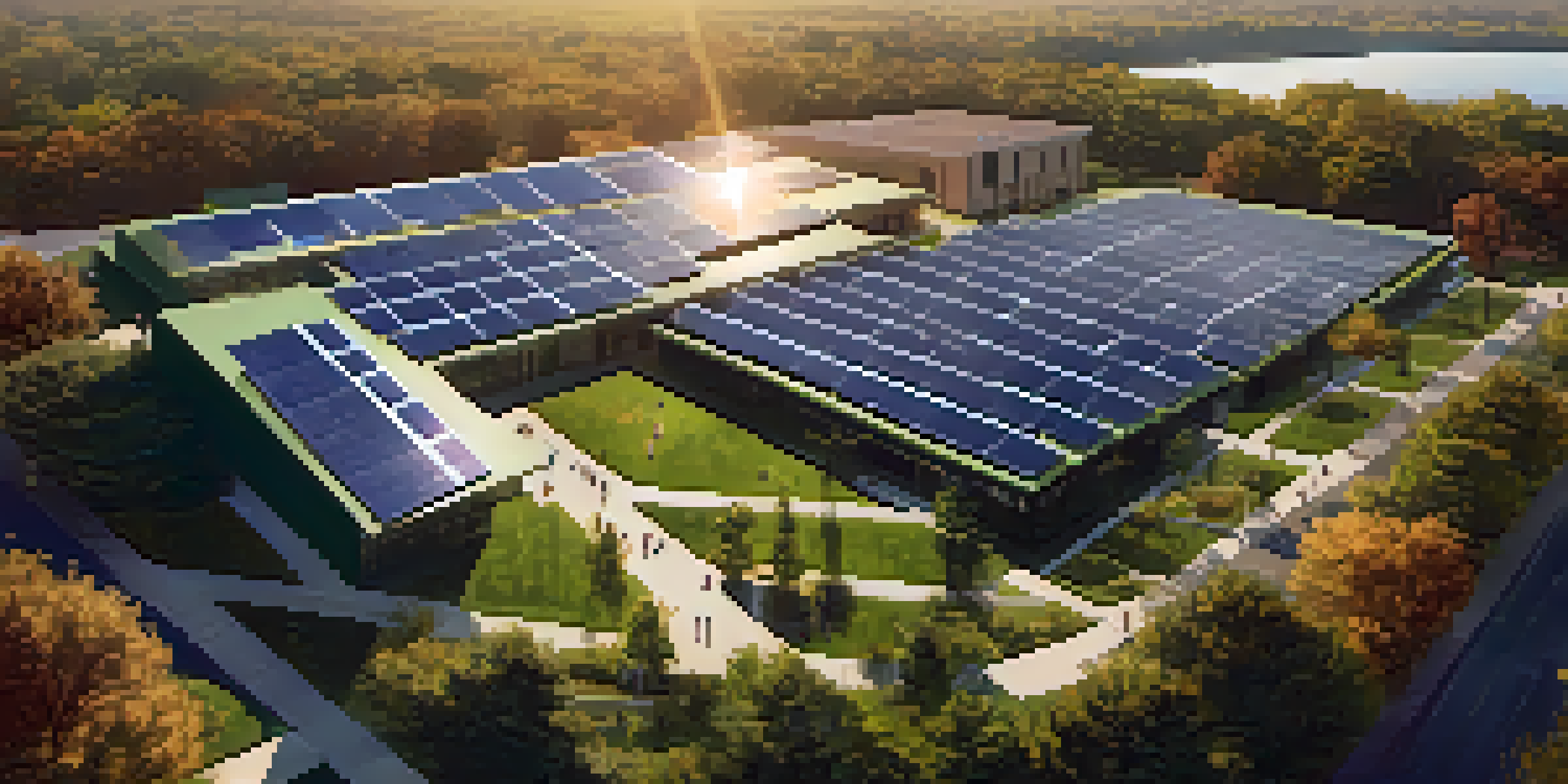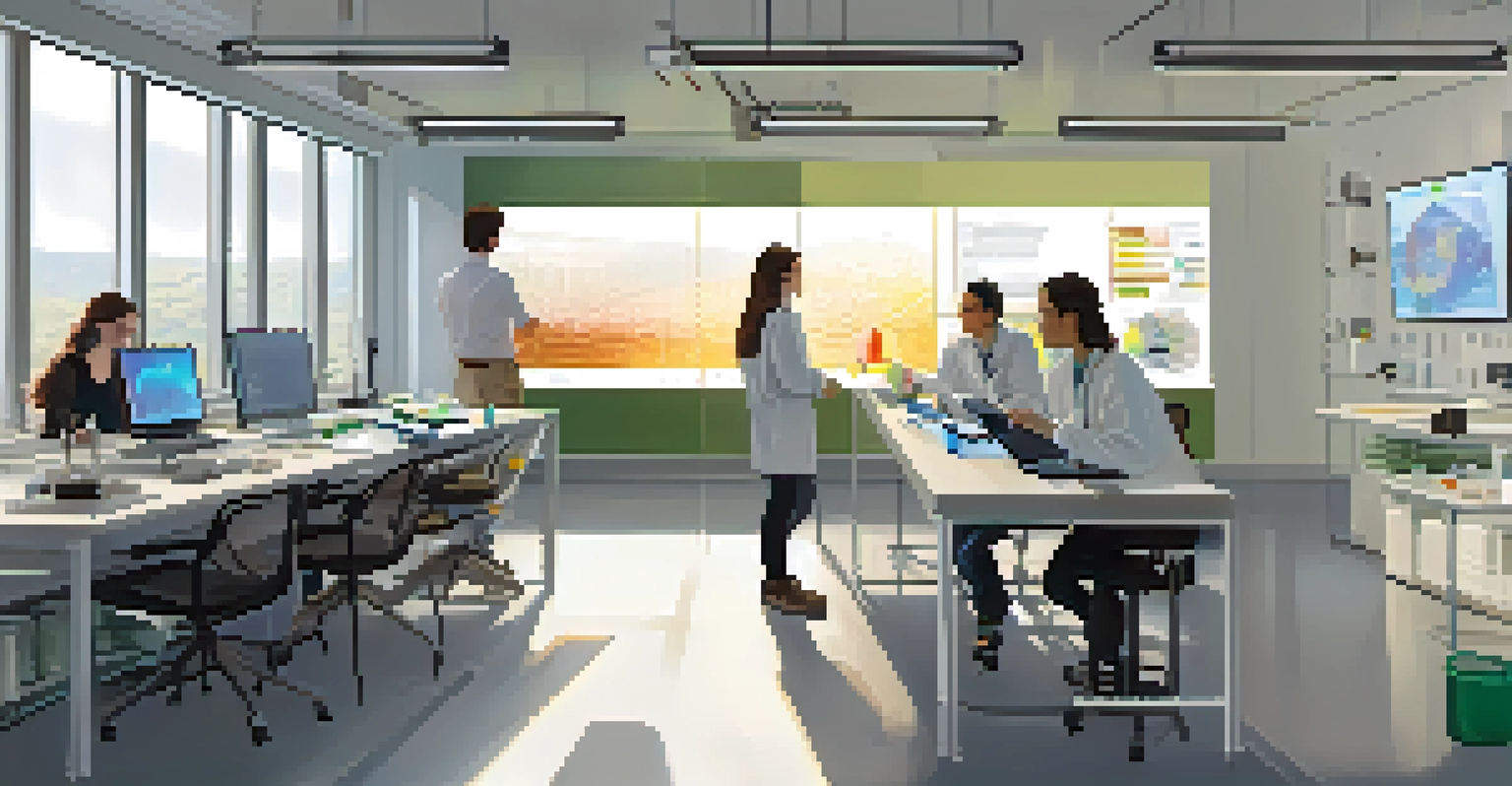Innovative Approaches to Environmental Science at MSU

Interdisciplinary Collaboration Boosts Research
At Michigan State University (MSU), environmental science thrives on interdisciplinary collaboration. Researchers from diverse fields such as biology, engineering, and social sciences come together to tackle pressing environmental issues. This collaborative approach allows for a more holistic understanding of complex problems, leading to innovative solutions that might not emerge in isolation.
Collaboration allows us to know more than we are capable of knowing by ourselves.
For instance, an ongoing project combines data science with ecology to better track wildlife populations. By leveraging big data analytics, researchers can identify trends and make informed decisions for conservation efforts. This synergy not only enhances research outcomes but also provides students with a richer, more engaging learning experience.
Moreover, these collaborations extend beyond the university. MSU partners with local governments, non-profits, and other institutions, fostering a network of knowledge exchange. This connection ensures that research is not just theoretical but also practical, directly benefiting communities and the environment.
Cutting-Edge Technology Enhances Environmental Monitoring
MSU is at the forefront of integrating technology into environmental science. Researchers are using drones and remote sensing technology to monitor ecosystems in real-time, providing critical data that was previously difficult to obtain. This innovative approach allows scientists to assess changes in land use, vegetation health, and water quality with unprecedented accuracy.

One exciting example is the use of drones to survey wetlands. These aerial platforms can cover vast areas quickly and gather high-resolution images, giving researchers insights into habitat conditions. This not only speeds up the data collection process but also reduces the environmental impact of traditional surveying methods.
Interdisciplinary Research Drives Innovation
At MSU, collaboration among diverse fields enhances understanding and leads to innovative environmental solutions.
Additionally, the university's commitment to developing new technologies is evident in its investment in lab resources and training. Students are encouraged to engage with these tools, preparing them for careers in an increasingly tech-driven environmental field.
Sustainable Practices in Campus Operations
MSU is not just teaching sustainability; it’s living it every day. The university has implemented a range of sustainable practices across its campus operations, setting a strong example for students and the community. From energy-efficient buildings to composting programs, MSU demonstrates that sustainability can be woven into the fabric of daily life.
The greatest threat to our planet is the belief that someone else will save it.
For instance, the campus has invested in solar energy, which powers several buildings and reduces reliance on fossil fuels. This not only lowers operational costs but also significantly decreases the university's carbon footprint. Such initiatives inspire students to think critically about their own environmental impact.
Moreover, the university regularly engages students in sustainability efforts, encouraging them to take part in initiatives like tree planting and recycling drives. This hands-on involvement fosters a sense of responsibility and empowers the next generation to be proactive about environmental stewardship.
Community Engagement and Environmental Education
MSU places a strong emphasis on community engagement as part of its environmental science initiatives. By partnering with local organizations and schools, the university promotes environmental education and awareness among diverse audiences. This outreach helps cultivate a community that is informed and invested in sustainable practices.
One notable program involves MSU students working with local schools to teach children about ecosystems and conservation. These interactive sessions not only enhance the students' learning experience but also instill a sense of environmental responsibility from a young age. Such initiatives create a ripple effect, as educated youth often inspire their families and peers to adopt more sustainable habits.
Technology Transforms Environmental Monitoring
MSU leverages cutting-edge technology like drones to provide real-time data for more accurate ecosystem assessments.
Additionally, MSU hosts public events like workshops and seminars that focus on current environmental issues. These gatherings provide a platform for sharing knowledge and foster dialogue between experts and community members, making science accessible and relevant.
Innovative Research Projects Addressing Climate Change
Climate change is one of the most pressing challenges of our time, and MSU is actively contributing to the research needed to combat it. Faculty and students are involved in innovative projects that explore everything from carbon sequestration to renewable energy solutions. This research not only deepens understanding but also creates actionable strategies for mitigation and adaptation.
For example, a recent project focused on developing crops that can withstand extreme weather conditions. By utilizing advanced genetic techniques, researchers aim to enhance food security in a changing climate. Such breakthroughs could prove vital for farmers facing unpredictable growing seasons.
Moreover, MSU's commitment to proactive research attracts funding and partnerships with industry leaders, amplifying the impact of its work. This collaborative spirit ensures that research findings are not only published but also translated into practical applications that benefit society at large.
Student-Led Initiatives Foster Innovation
At MSU, students play a pivotal role in driving innovation in environmental science. Through various clubs and organizations, students initiate projects that address environmental issues both on campus and in the wider community. These initiatives empower students to take ownership of their education and contribute to meaningful change.
For instance, the Student Environmental Alliance organizes clean-up events, tree-planting campaigns, and awareness drives, all aimed at promoting sustainability. Such activities provide hands-on experience and encourage leadership skills, preparing students for future careers in environmental fields.
Global Partnerships Enhance Sustainability
By collaborating with international institutions, MSU broadens its research impact and contributes to global environmental efforts.
Additionally, MSU supports student-led research projects by providing funding and resources. This encouragement fosters a culture of innovation and creativity, where students feel inspired to explore new ideas and solutions to environmental challenges.
Collaborative Global Partnerships for Sustainability
MSU recognizes that environmental challenges often transcend borders, which is why global partnerships are a cornerstone of its approach. By collaborating with institutions and organizations worldwide, MSU enhances its research capabilities and contributes to global sustainability efforts. These partnerships open doors to diverse perspectives and innovative solutions.
One prominent initiative involves working with universities in developing countries to address local environmental issues. This collaboration not only provides valuable insights but also empowers communities to implement sustainable practices that resonate with their unique contexts. It’s a win-win situation where knowledge is shared, and real-world impact is achieved.

Moreover, these global connections enrich the educational experience for students. They have opportunities to participate in exchanges and collaborative projects, allowing them to gain a broader understanding of global environmental challenges and the importance of working together for solutions.